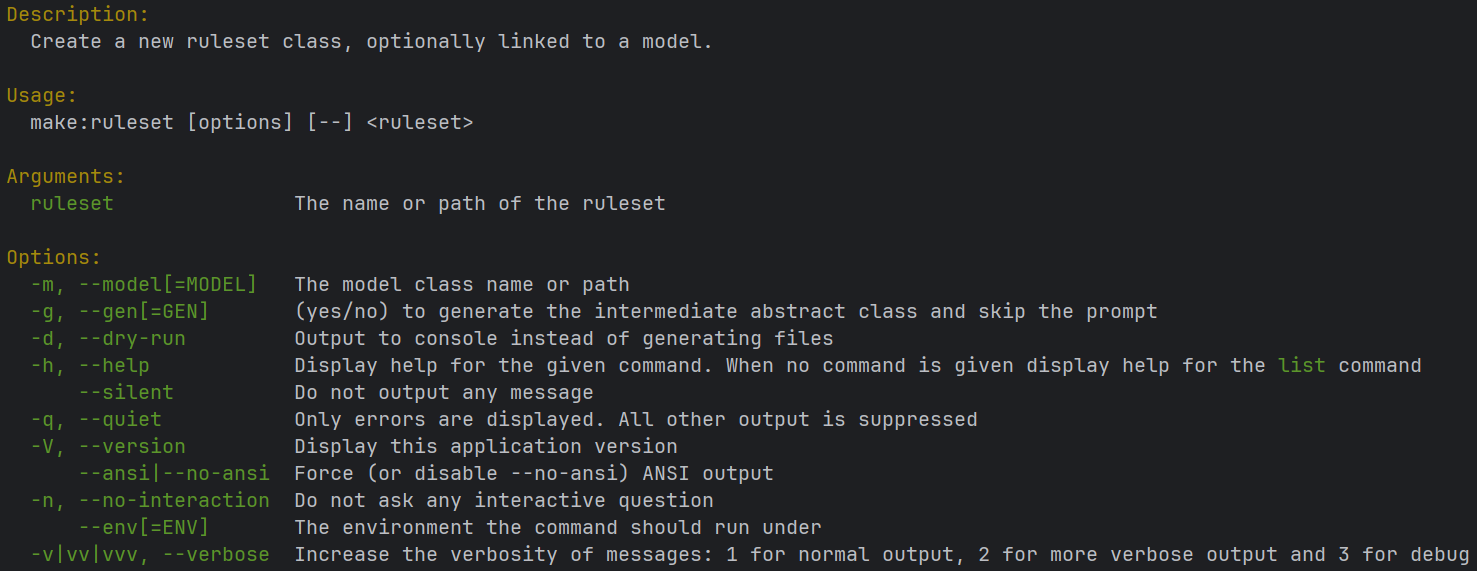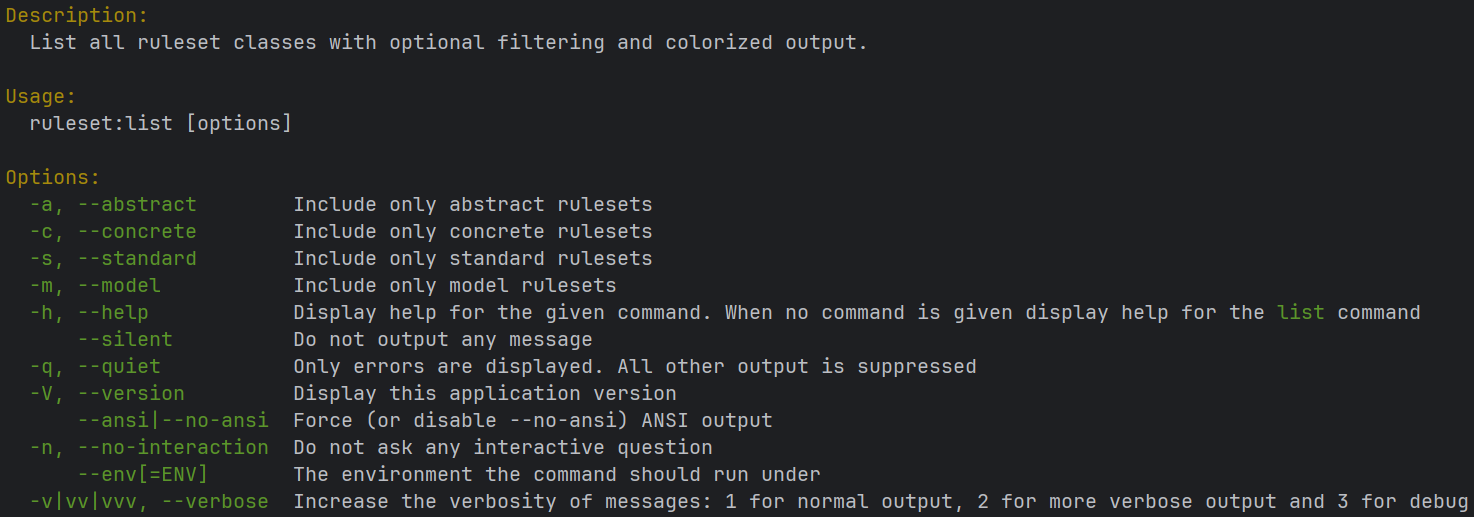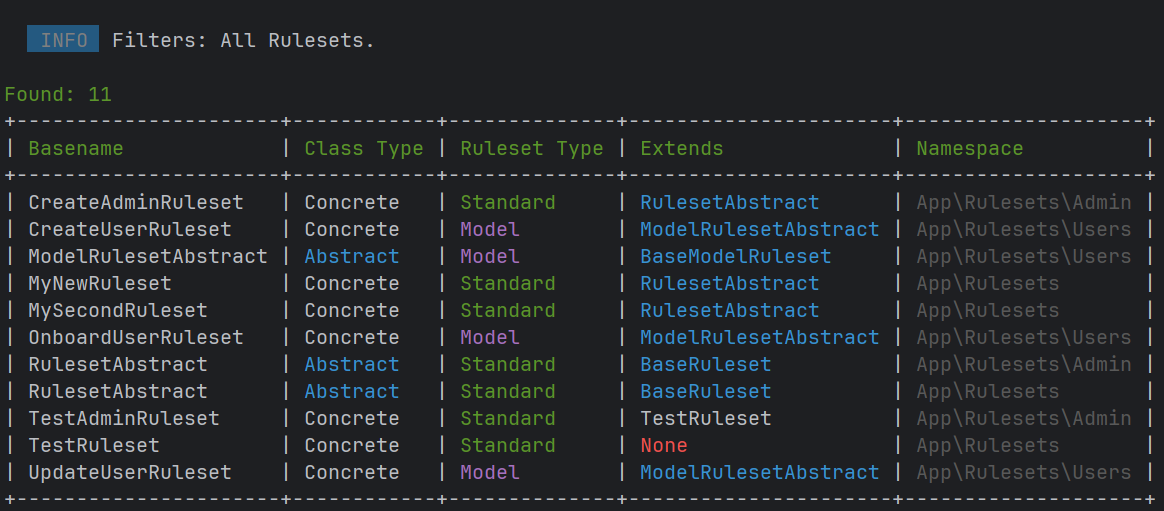sjshovan / laravel-ruleset-validation
A modular, object-oriented validation system for Laravel
Installs: 3
Dependents: 0
Suggesters: 0
Security: 0
Stars: 0
Watchers: 0
Forks: 0
Open Issues: 0
pkg:composer/sjshovan/laravel-ruleset-validation
Requires
- php: ^8.2
- illuminate/support: ^9.0|^10.0|^11.0|^12.0
- spatie/laravel-package-tools: ^1.92
- spatie/php-structure-discoverer: ^2.0
- symfony/filesystem: ^5.4 || ^6.0 || ^7.0
Requires (Dev)
- orchestra/testbench: ~7
- phpunit/phpunit: ~9.0
This package is auto-updated.
Last update: 2026-01-02 00:44:48 UTC
README

A modular, object-oriented validation system for Laravel.
Abstract
Unlike traditional array-based rules scattered across controllers and form requests, this package introduces standalone and model-aware ruleset classes with support for:
- Rule reuse and extension via class inheritance
- Fluent rule composition within rulesets
- Centralized rules, messages, and attributes
- Seamless integration with Laravel’s native validator
- Ruleset management via Artisan make and list commands
This abstraction addresses the growing complexity and duplication in large Laravel codebases, where validation rules often become deeply nested, repetitive, or context-specific.
By shifting validation into dedicated, composable classes, Laravel Ruleset Validation enables clean architecture, code reuse, and a more scalable approach to application validation.
Supported Laravel Versions
| Laravel Versions | Ruleset Validation Version | PHP Version |
|---|---|---|
| ≥ 9.x | 1.x | ≥ 8.2 |
Table of Contents
- Installation
- Quickstart
- Defining Rulesets
- Validating Rulesets
- Extending Rulesets
- Fluent RuleBuilder
- Artisan Commands
- Configuration
- Package Utilities
- Testing
- Changelog
- Contributing
- Security
- License
Installation
composer require sjshovan/laravel-ruleset-validation
Optionally publish config:
php artisan ruleset-validation:install
Quickstart
use App\Rulesets\UserRuleset; use App\Models\User; // Standard ruleset $ruleset = UserRuleset::new(); $validated = $ruleset->validator([ 'email' => 'foo@example.com', 'name' => 'Foo Bar', ])->validate(); // Model-aware ruleset $user = User::find($id); $validated = UserRuleset::for($user)->validator([ 'email' => 'foo@example.com', 'name' => 'Foo Bar', ])->validate();
Example usage for standard and model-aware rulesets.
Defining Rulesets
Base classes for rulesets:
Sjshovan\RulesetValidation\Abstracts\BaseRuleset– standard rulesetsSjshovan\RulesetValidation\Abstracts\BaseModelRuleset– model-aware rulesets
Standard Ruleset
use Sjshovan\RulesetValidation\Abstracts\BaseRuleset; class UserRuleset extends BaseRuleset { public function rules(): array { return $this->builder([ 'email' => [Rule::email()->rfcCompliant(strict: false), 'max:64'], 'profession' => 'string', 'age' => 'int|min:12', 'weight' => 'int' ]) ->add('name', 'string', 'min:4|max:32', ['not_in:hello,world']) ->remove('age', 'weight') ->prependAll('required') ->prepend('profession', 'sometimes') ->get(); } public function messages(): array { return [ 'email.max' => 'Your :attribute may not be greater than :max characters.', ]; } public function attributes(): array { return [ 'email' => 'email address', ]; } }
use App\Rulesets\UserRuleset; $ruleset = UserRuleset::new();
Model-Aware Ruleset
use Sjshovan\RulesetValidation\Abstracts\BaseModelRuleset; use App\Models\User; class UserPostRuleset extends BaseModelRuleset { public static function modelClass(): string { return User::class; } public function rules(): array { return [ 'slug' => 'required|unique:posts,slug,' . $this->model()->id, ]; } }
use App\Rulesets\UserPostRuleset; use App\Models\User; $user = User::findOrFail($id); $ruleset = UserPostRuleset::for($user);
Validating Rulesets
You can validate rulesets directly from the ruleset itself or by integrating with Laravel’s validator.
Using the validator() Method
$validated = UserRuleset::new()->validator([ 'email' => 'foo@example.com', 'name' => 'Foo Bar' ])->validate();
All rulesets from the base abstracts include a validator() method, returning a fully configured Laravel validator.
Using the Factory Decorator
Validator::makeFromRuleset( UserRuleset::new(), [...] )->validate();
Wraps Laravel’s existing Illuminate\Validation\Factory to add the makeFromRuleset() method.
- Preserves validator extensions regardless of when they were registered (before or after).
- Drop-in safe for existing apps.
Note: Disabled by default.
See Configuration for enabling instructions viafactory_decorator.
Using the Concrete Factory
app(Factory::class)->makeFromRuleset( UserRuleset::new(), [...] )->validate();
Replaces Laravel’s Illuminate\Validation\Factory with the package’s RulesetFactory.
- Lets you type-hint
makeFromRuleset()directly. - Extensions work as long as they’re registered after the swap (e.g., in your app’s boot()).
Note: Disabled by default.
See Configuration for enabling instructions viafactory_concrete.
Extending Rulesets
Provided tools for custom abstracts:
Sjshovan\RulesetValidation\Contracts\Ruleset– for standard rulesetsSjshovan\RulesetValidation\Contracts\ModelRuleset- for model-aware rulesetsSjshovan\RulesetValidation\Traits\IsRuleset– implementsRulesetcontractSjshovan\RulesetValidation\Traits\InstantiatesModel– adds model awarenessSjshovan\RulesetValidation\Traits\HasRuleBuilder– provides a rule builderSjshovan\RulesetValidation\Traits\HasRulesetValidator– provides a ruleset validator
Note: You can override default abstracts for
make:ruleset.
See Configuration for more details.
Using Intermediate Abstracts
Intermediate abstracts allow you to define shared rules, messages, or attributes for multiple child rulesets.
namespace App\Rulesets\User; use Sjshovan\RulesetValidation\Abstracts\BaseRuleset; abstract class UserRulesetAbstract extends BaseRuleset { public function rules(): array { return [ 'email' => 'email|max:64', 'profession' => 'string', 'age' => 'int|min:12', 'weight' => 'int' ]; } } class CreateUserRuleset extends UserRulesetAbstract { public function rules(): array { return $this->builder(parent::rules()) ->add('name', 'string', 'min:4|max:32', ['not_in:hello,world']) ->remove('age', 'weight') ->prependAll('required') ->prepend('profession', 'sometimes') ->get(); } }
Fluent RuleBuilder
The RuleBuilder lets you start with an empty or existing rules array and fluently add, modify, or remove rules. If you
extend the package’s base abstracts, you get a protected builder() method for free within child classes. You can also
instantiate it directly for external use.
use Sjshovan\RulesetValidation\RuleBuilder; // Basic usage $rules = RuleBuilder::new(['email' => 'required|string|email']) ->add('email', 'max:255') ->prepend('email', 'nullable') ->get(); // Merge and remove $rules = RuleBuilder::new(['name' => 'required|string']) ->merge(['name' => ['max:50'], 'email' => 'nullable|email']) ->remove('name') ->get(); // Clear and reset $rules = RuleBuilder::new(['email' => 'required|email']) ->clear() ->set('username', 'required') ->get(); // Prepend to all $rules = RuleBuilder::new(['name' => 'string', 'email' => 'email']) ->prependAll('required') ->get(); // Conditional logic $isAdmin = true; $rules = RuleBuilder::new(['role' => 'string']) ->when($isAdmin, fn($b) => $b->add('role', 'in:admin,editor')) ->get(); // Return as a collection $collection = RuleBuilder::new(['title' => 'required|string'])->collect();
Artisan Commands
make:ruleset
php artisan make:ruleset --help
Generates rulesets in the configured output path, optionally creating model-aware rulesets and intermediate abstracts.
# Standard ruleset php artisan make:ruleset MyRuleset # Model-aware ruleset php artisan make:ruleset MyRuleset -mUser # Generate intermediate abstract automatically php artisan make:ruleset MyRuleset -g # Dry run (output to console only) php artisan make:ruleset MyRuleset -d
Intermediate Abstract Behavior:
Enabled:
- Detects if ruleset is standard or model-aware.
- Searches for intermediate abstract.
- If missing, prompts to generate.
- If declined, extends the configured base abstract.
- If found, extends it automatically.
Disabled:
- Ruleset always extends the configured base abstract.
ruleset:list
php artisan ruleset:list
Lists all rulesets in the configured output path, showing which are concrete or abstract, along with their namespaces.
# List all php artisan ruleset:list # Include Standard only php artisan ruleset:list -s # Include Model only php artisan ruleset:list -m # Include Abstract only php artisan ruleset:list -a # Include Concrete only php artisan ruleset:list -c # All (default) php artisan ruleset:list -s -m -a -c
Example output:
Configuration
Publish the configuration file:
php artisan ruleset-validation:install
This creates config/ruleset-validation.php, where you can adjust:
-
paths — ruleset output directory and model discovery locations.
-
convention — default base abstract classes and suffix for ruleset names.
-
behavior — enable/disable the factory decorator, intermediate abstract generation, and suffix enforcement.
Default config:
<?php return [ 'paths' => [ 'ruleset_output' => app_path('Rulesets'), 'model_discovery' => [app_path('Models')], ], 'convention' => [ 'base_abstracts' => [ 'ruleset' => \Sjshovan\RulesetValidation\Abstracts\BaseRuleset::class, 'model_ruleset' => \Sjshovan\RulesetValidation\Abstracts\BaseModelRuleset::class, ], 'ruleset_suffix' => 'Ruleset', ], 'behavior' => [ 'factory_decorator' => false, 'factory_concrete' => false, 'convention' => [ 'intermediate_abstracts' => true, 'ruleset_suffix' => true, ], ], ];
Note: See the published config file for descriptions.
Package Utilities
Sjshovan\RulesetValidation\Support\Package is a central utility class that consolidates configuration access, path
resolution, and stub generation for the package.
It provides:
-
Configuration access
- Reads from
config/ruleset-validation.php. - Retrieves paths, conventions, and behavior flags.
- Reads from
-
Stub management
- Loads stub files from the
/stubsdirectory. - Renders stubs with placeholder replacements for code generation.
- Loads stub files from the
-
Path resolution
- Resolves package-relative paths.
- Provides helpers for output directories and model discovery locations.
-
Behavior toggles
- Checks if the factory decorator is enabled.
- Determines suffix enforcement and intermediate abstract generation.
Note: This class is primarily intended for the package’s internal use. However, its helper methods are available if you find them useful in your own code.
Testing
composer test
Changelog
See changelog.md for a list of changes.
Contributing
See contributing.md for contribution guidelines.
Security
If you discover any security issues, please see security.md.
Credits
License
This package is licensed under the MIT License. See license.md for details.



